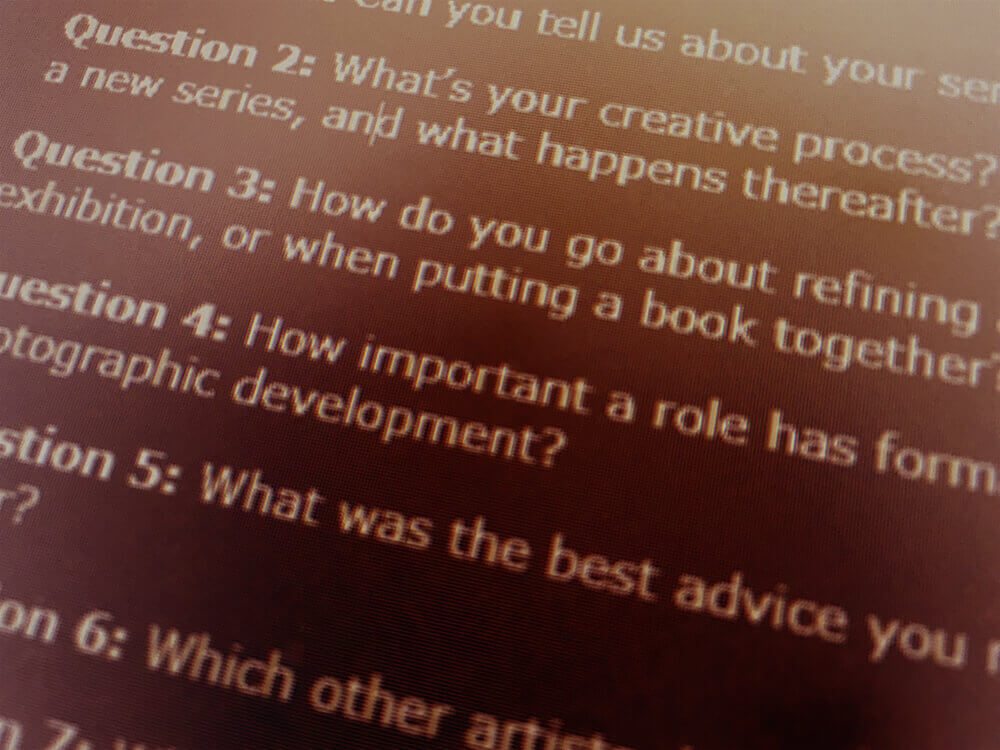EDUCATION
Interview Dos and Don’ts
BY GEMMA PADLEY
How to handle interviews: by email, over the phone and in person
“Learning how to work with members of the press, and making sure you get the most out of any interview opportunity are invaluable skills to develop”
Gemma Padley is a freelance journalist and editor who has worked at the British Journal of Photography and written for a host of clients including Foam, Photomonitor, 1000 Words Magazine, Elephant magazine, AnOthermag.com, and Magnum Photos. In the second of a new educational series, she advises on interview-giving, reasoning that knowing your project inside out is the key to giving a strong interview, whatever format it may take.
If you are in the process of building your career as a professional photographer, at some point you may be invited by a journalist to give an interview about your work. Perhaps a magazine is interested in a recent project you’ve been working on, or has heard about a new book you’ve published, or an exhibition with which you are involved.
Learning how to work with members of the press, and making sure you get the most out of any interview opportunity are invaluable skills to develop – not least because having an article published about you and your work provides all important exposure. It should, if handled in the right way, help you to build and strengthen your brand.
Before agreeing to an interview, the first thing I would stress is to work out how beneficial having your work featured in ‘x’ magazine or blog is likely to be. There are countless magazines and blogs out there, all desperate for content. Many won’t pay to feature your photographs so you have to sure make you’re getting something back in return. If the magazine has a substantial following on social media, for example, and offers to promote any article it publishes, it may be worth giving the interview; or indeed if it is a respected name in the industry. But always think carefully before agreeing to give away your images and time for free. It doesn’t hurt to do some quick research about the brand and/or person that has approached you before replying to their request for an interview. In short, don’t be too quick to jump.
If you’re happy to go ahead, find out how the interview will be conducted. Perhaps the person has suggested you meet, speak over the phone or Skype, or asked you to answer questions over email. If you agree to meet in-person, make sure you’ve spent time beforehand thinking about the key ideas of the project/s you’re discussing and your experiences in the industry to date. Make notes when preparing if it helps you to order your thoughts. You could even ask what kind of questions the person is planning to ask ahead of the meeting, or least request they give you an idea of proposed talking points. The same applies if you are being interviewed over the phone or Skype. It helps to do some preparation in terms of thinking back over your career and recent projects, but when it comes to the actual interview, try not to rely heavily on notes, but instead respond to questions as they come – think of it as a conversation or an exchange of ideas rather than an interview as such.
Answering questions over email is a slightly different ball game in that you have control over the answers you give since you are writing them. Make sure you have a clear idea of the kind of feature the person will be writing so you can tailor your answers accordingly. If he or she is writing a short piece then it’s a waste of your time writing hundreds of words per question – chances are the majority of your comments won’t be used. But if it’s longer read then there may be room for you to expand upon your answers. Try to write naturally and not get hung up on how you’re coming across. If the journalist is a professional, then he or she will be able to correct any grammatical errors. Speaking from personal experience, it’s far more useful to have comments from an interviewee that are a bit wonky in places but that express the photographer’s true character and motivations than reams of polished quotes devoid of emotion and personality. If find you’ve been sent similar questions to a previous email interview don’t just re-use old ‘stock’ answers or swathes of material from a press release or project statement, as tempting as that might be. Try to write something fresh if possible, even though answering the same questions may be irritating (and understandably so). An interview (even an unoriginal one) is a chance to get across what you do, why, and how, so make the most of it.
And please don’t ask for copy approval – it is every journalist’s worst nightmare! It compromises editorial independence and adds to the writer’s workload, which, when working to tight deadlines is a recipe for bad feeling. If you have agreed to give an interview to a professional journalist, then trust he or she will deliver.
